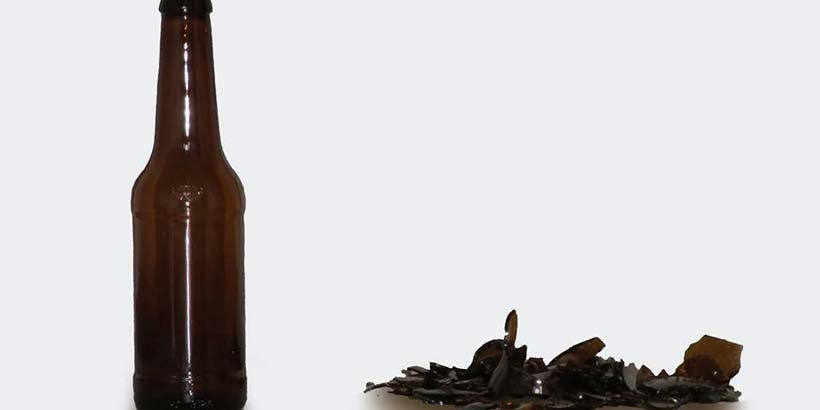Over the last couple of decades, countless schemes have been introduced across the UK to encourage the reducing, reusing and recycling of our waste materials. These three R’s are important as they save the world’s natural resources and have the potential to drastically cut the amount of energy that is required to make a product from scratch.
A reduction in energy usage, and the pollution as a result of this, is becoming increasingly important. This is supported by the recent news that, for the first time, global temperatures have increased by 1ᵒC since 1900. This places us half way to a 2ᵒC increase, which is said to be the gateway to dangerous warming for our planet.
The general idea of the first R; Reducing, is quite simply the reduction of the materials used. For the average person ‘reducing’ is a lifestyle choice, which would require people to buy less or buy in bulk to save on packaging. For industry this process could mean reducing the amount of material used while maintaining the functionality of the products that are being used.
Reusing is also quite simple. Many items can be reused either in the way there were intended to be used, such as plastic bottles or jars, or reused for a different purpose. An example of this is the creation of a tyre swing or using bottle tops for arts and crafts. Alternatively, things can be repaired and then reused.
Recycling is the process where an item is broken down to its basic components, from which a new product is created. Some examples of recycling include; recycling plastic bottles and turning them into polyester clothing or turning glass bottles into physical abrasives.
These ‘3 R’s’ in order of sustainable importance. This deduces that the option of ‘reducing’ should be the preferred option. Despite this, recycling has gained the most popularity and unfortunately many people don’t understand the importance of reducing and reusing above the option of recycling. Whilst recycling is far better than throwing things away for landfill, we are taught that recycling is a good thing but not about how much more effective reusing or reducing is.
Big business, big impact
I believe that large businesses may be a big part of the reason as to why recycling has gained so much publicity. It is now common for companies to promote and advertise how environmentally friendly they are to their consumers. One of the easiest ways for them to do this is through advertising their use of recyclable materials. Reducing and reusing materials is often more difficult for businesses to successfully implement without a reduction in quality. Reducing and reusing materials is also more time consuming and requires more effort from them.
Additionally, using recycling bins at home has become a part of our daily lives in order to ensure all of our waste is taken away. An easy way to demonstrate how much more attention ‘recycling’ is getting than ‘reusing’ is to google each of the terms. You will find that there are over 10 times as many results for recycling.
The extensive attention surrounding recycling is leading society to fall into a naïve culture whereby people are purchasing items and feeling good about themselves when those very items are recycled. People don’t seem to understand that recycling still uses natural resources and requires a lot of energy, which in turn is contributing to global warming at a much larger scale than if the items were to be reused or initially reduced at the stage of purchase.
Doing the maths
Information about recycling often contains positive facts and figures, ‘Recycling a glass bottle saves enough energy to power the average light bulb for 4 hours!’ being a prime example of this. Frustratingly, more detailed and accurate information is not being provided to the general public and the subject must be researched to gain a truer understanding.
In actual fact, the average glass bottle weighs about 180grams, which means that the amount of energy required to produce just the glass for one bottle alone from scratch is around 4.7 megajoules. When you subtract the energy saved by recycling a glass bottle, approximately 1 megajoule, from the amount of energy required to produce the glass, it tells us it takes approximately 3.7 megajoules to produce a recycled bottle. Enough energy to run that same lightbulb for 17 hours!

Facts, figures and common sense
- Glass bottles and jars are the perfect type of packaging to be reused, as they don’t vary very much in size or shape and are unaltered once used.
- It makes sense to reuse metal or plastic packaging rather than recycling them. Unlike paper, these materials will probably be turned back into the same item that they were originally. So what’s the point? You might as well just save the energy and reuse the item as they were first made.
- The idea of reusing glass bottles isn’t new. Milk bottles have been reused in Britain for decades. Originally this was because it was expensive to produce glass bottles. At this current time, glass milk bottles are used an average of 13 times before being recycled. So why don’t we all start doing the same with other similar items?
My story and similar schemes
I was volunteering in Nicaragua with Progressio ICS this summer where I witnessed a scheme that had been adopted by major drinks companies. Empty glass bottles are handed back into the shops where they were purchased. After they are re-collected, these bottles are then washed and refilled. This means that these particular drinks are offered at cheaper prices as well as being environmentally friendly.
In some European countries, such as Germany, Finland and The Netherlands, they have begun encouraging reusing in a similar way to Nicaragua. A deposit is returned to the customer when certain items, such as glass or plastic bottles, jars and cans, are returned to a shop. A similar system could be introduced for food packaging.
It’s your turn
It is probably quite likely that you are already reusing things at home such, as refilling water bottles or reusing carrier bags, especially after the government’s recent introduction of the 5p charge. Now, hopefully, the importance of reusing over recycling has been emphasised and you are more likely to consider what you buy and what actions you take more carefully.
If we as individuals decide to change our habits in regards to reusing the products that we buy, local councils and large businesses will have to change and give ‘reusing’ the huge media attention that recycling receives.
Just think about how much less energy would be consumed and the amount of our money, natural resources and planet would be saved if companies decided to change from recyclable packaging to reusable packaging.
Written by ICS Alumni Adam Wain (July – September cycle 2015, Nicaragua)



